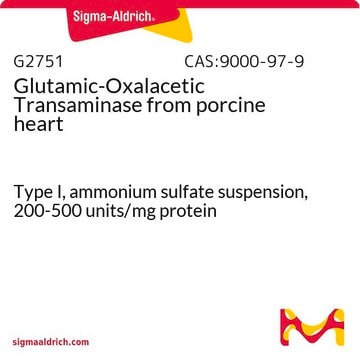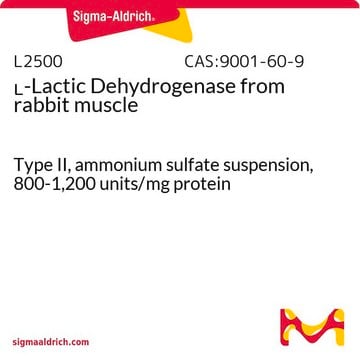G9880
Glutamic-Pyruvic Transaminase from porcine heart
ammonium sulfate suspension, ≥75 units/mg protein
Synonym(s):
ALT1, L-Alanine: 2-Oxoglutarate Aminotransferase, Alanine Aminotransferase (catalytic concentration), GPT
About This Item
Recommended Products
biological source
Porcine heart
Quality Level
form
ammonium sulfate suspension
specific activity
≥75 units/mg protein
mol wt
42 kDa
foreign activity
L-glutamic dehydrogenase, lactic dehydrogenase and malic dehydrogenase ≤0.01%
glutamic-oxalacetic transaminase ≤0.05%
shipped in
wet ice
storage temp.
2-8°C
Looking for similar products? Visit Product Comparison Guide
General description
Glutamic-pyruvic transaminase (GPT) is located in most cells in the body but is found in highest concentrations in the liver. Two GPT isoforms, GPT1 and GPT2, are present in mammals.
Application
Biochem/physiol Actions
Unit Definition
Physical form
Analysis Note
Signal Word
Danger
Hazard Statements
Precautionary Statements
Hazard Classifications
Resp. Sens. 1
Storage Class Code
11 - Combustible Solids
WGK
WGK 3
Flash Point(F)
Not applicable
Flash Point(C)
Not applicable
Personal Protective Equipment
Choose from one of the most recent versions:
Certificates of Analysis (COA)
Don't see the Right Version?
If you require a particular version, you can look up a specific certificate by the Lot or Batch number.
Already Own This Product?
Find documentation for the products that you have recently purchased in the Document Library.
Articles
Instructions for working with enzymes supplied as ammonium sulfate suspensions
Our team of scientists has experience in all areas of research including Life Science, Material Science, Chemical Synthesis, Chromatography, Analytical and many others.
Contact Technical Service







